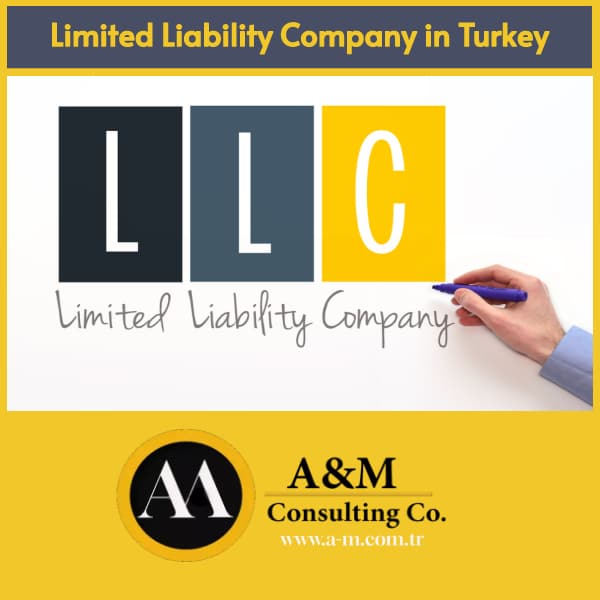
Limited Liability Company in Turkey
Limited Liability Company in Turkey: Setup & Regulations
A Limited Liability Company (LLC) in Turkey, known as “Limited Şirket” (Ltd. Şti.), is a popular business structure for both local and foreign entrepreneurs due to its flexibility, limited liability, and straightforward establishment & liquidation process.
In this article you are going to find an in-depth look at the essential aspects of forming and operating an LLC in Turkey.
Table of Contents
Key Features of LLC in Turkey
1- Limited Liability
Shareholders are only liable for the company’s debts to the extent of their share capital. (Excluding public debts)
This provides a significant level of financial protection.
Personal assets are protected from business debts.
2- Minimum Share Capital
The minimum share capital required to establish an LLC is 50,000 Turkish Liras (TRY).
This amount must be paid off by shareholders to the bank account of the company within 24 months.
3- Shareholders
An LLC can be established by at least one and up to 50 shareholders.
These shareholders can be individuals or legal entities.
100% ownership is avaliable for foreigners.
4- Management
At least one of shareholders has to be a Manager.
Other directors can be from shareholders or non-shareholders.
It may be arranged on the articles of incorporation that directors can use their signature individually or common during representing the company.
5- Name Requirements
The company name must include “Limited Şirket” to denote its limited liability status.
The name should also be unique and not resemble existing company names in Turkey.

Steps to Establish an LTD in Turkey
1. Draft the Articles of Association
This document outlines the company’s purpose, capital, management structure, and operational rules. It must be prepared as online on MERSIS system before submission.
2. Deposit the Minimum Share Capital
The undertaken equity must be paid off within 24 months by shareholders to the bank account of company. Full or part of the initial share capital may be deposited into a bank account opened in the name of the company, under formation at the establishing time of company, optionally.
3- Register with the Trade Registry
The articles of association, registration form, ID, Tax ID & contact info of shareholders proof of share capital deposit, and other required documents must be submitted to the local Trade Registry Office.
4- Tax Registration & Getting a Tax Identification Number
The company must register with the local tax office to obtain a tax identification number.VAT, Withholding(WHT) Tax, Provisional Tax and Corporate Income Tax(CIT) registrations must be made with this number. identification number.
5- Registry of e-notification
E-notification registration for tax office must be made within 15 days immediately after tax registration. Otherwise, administrative fines will be imposed.
6- Social Security Registration
The company must register with the Social Security Institution (SGK) to ensure compliance with employment and social security regulations.This is usually done automatically with registration of the company, but it is still useful to confirm it.
7- Publication
The establishment of the company must be announced in the Turkish Trade Registry Gazette.You can confirm this with the Registry Gazette that the registry office will deliver to you after registration has done. Additionally, a registration certificate will be issued for your company as duly.
Taxation of LLCs in Turkey
A Limited Liability Company (LLC) in Turkey (Türk Limited Şirketi) is one of the most common business structures due to its flexible management and limited liability for shareholders. However, understanding the taxation system including available incentives and exemptions is essential for compliance and financial planning.
1. Corporate Income Tax (CIT)
LLCs in Turkey are subject to corporate income tax (CIT) on their worldwide income if they are considered tax residents. The current corporate tax rate is:
✅ Standart rate is 25% for 2025
✅ Non-resident LLCs (foreign-owned branches) are taxed only on Turkey-sourced income
✅ Quarterly advance tax payments are deducted from the CIT liability.
2. Quarterly Corporate Income Tax (Provisional Tax)
✅ Corporate provisional tax is a prepayment system for LLCs
✅Tax rate is 25%
✅ LLCs pay a portion of their annual corporate tax in quarterly installments.
✅ Payments are due four times a year:
May 17 (Q1: Jan–Mar)
Aug 17 (Q2: Apr–Jun)
Nov 17 (Q3: Jul–Sep)
Feb 17 (next year) (Q4: Oct–Dec)
✅ This helps manage cash flow and reduce tax liabilities of LLCs throughout the year.
3. Value Added Tax (VAT) in Turkey
Turkish LLCs must comply with Value Added Tax (VAT) regulations:
✅ General VAT Rate: 20% (as of 2024, previously 18%)
✅ Reduced Rates: 18%, 10% and 1% for specific goods and services (e.g., essential food items, real estate sales)
✅ VAT Refunds: Available for exporters, R&D Expenses and companyies active in sector of Construction & Roaming
LLCs must file monthly VAT returns with the Turkish Revenue Administration.
4. Withholding Tax (WHT) in Turkey
Certain payments made by LLCs are subject to withholding tax (stopaj vergisi):
✅ Salaries & Wages paid to employees subject to income tax withholding as 15%-40% apply.
✅ Professional Service Fees:Payments made to self-employed professionals (Chartered Accountants, Lawyers, Translators, Consultants, Engineers, etc.) Tax rate is 20%
✅ Rent payments for business premises (offices, warehouses,
✅ Dividends to both resident and non-resident shareholders made by Turkish resident companies WHT applies as 15%
✅ Interest on bank deposits, bonds and treasury bills from loans provided by foreign entities WHT applies as 7,5% – 15%
✅ Payments to Non-Residents for professional service fees suc as consulting, engineering, or project management are subject to WHT as 20%
✅ Payments for Construction & Repair Work made for construction, maintenance, and repair services provided by subcontractors are subject to WHT as 5 %
Turkey has double taxation treaties (DTTs) with many countries, reducing WHT rates on cross-border transactions.
5. Social Security Contributions (SGK)
LLCs must register employees with the Social Security Institution (SGK) and pay:
✅ Employer Contribution: 20.5%-22.5% of gross salary(depending on the sector)
✅ Employee Deduction: 15% of gross salary
✅ Unemployment Insurance: Employer 2%, Employee 1%
Payroll taxes are filed monthly via the Social Security Administration (SGK) system.
Tax Incentives & Exemptions for LLCs
Turkey offers several tax incentives to LLCs:
1- Investment Incentive Program
- ✅ Corporate Tax Reductions: Reduced rates based on region and sector.
- ✅ VAT & Customs Duty Exemptions: No VAT or customs duty on machinery and equipment.
- ✅ Social Security & Interest Rate Support: Government covers employer social security contributions and offers loan interest support.
2- R&D Incentives
- ✅ 100% R&D Tax Deductions on eligible expenses.
- ✅ Income Tax & Social Security Exemptions for R&D employees.
- ✅ R&D Centers receive additional tax benefits.
3- Technoparks Incentives
- ✅ Corporate & Income Tax Exemptions for R&D businesses until 2023.
- ✅ VAT Exemption on software and R&D product sales.
4- Free Zones (FZ) Incentives
✅ Corporate Tax & VAT Exemptions for export-based businesses.
✅ Customs Duty Exemption on goods.
- ✅ Income Tax Withholding Exemptions for companies exporting 85%+ of production.
5- Strategic Investment Incentives
- ✅ Higher Tax Reductions & Interest Rate Support for key infrastructure projects.
- ✅ Land Allocation at Reduced Costs for strategic industries.
Advantages of an Limited Company in Turkey
1- Flexibility in Management
An LLC provides flexibility in structuring the management and operation of the company, making it suitable for small and medium-sized enterprises.
2- Ease of Establishment
The process of setting up an LLC in Turkey is relatively straightforward, with a well-defined legal framework. No cash capital is required for establishment.
3- Tax Benefits
Turkey offers various tax incentives and benefits for companies, including reduced corporate tax rates for specific sectors and regions.
4- Social Security Premium Suports
Turkey offers various social security premium incentives and benefits for companies, specific sectors such as IT and regions such as Technopark.Additionally, employers who do not have premium debt receive an indefinite and unconditional 5% premium support.
5- Foreign Investment Friendly
There are no restrictions on foreign ownership of an LLC in Turkey, making it an attractive option for international investors.
Compliance and Reporting Requirements for LLC
Applying for Business Licenses: If your company in Turkey intends to engage in regulated activities such as health or education, it is mandatory to complete the business licensing phase. This process involves obtaining specific business licenses and permits from the relevant authorities overseeing your industry.
- Setting Up the Accounting System: In Turkey, Companies must record their financial transactions completely and accurately in accordance with the Turkish Tax System and Generally Accepted Accounting Practices. These records must be archived and made available upon request, making an effective accounting system indispensable.
Financial Reporting: Companies must prepare and submit annual financial statements in accordance with Turkish accounting standards.
Tax Filings: Regularly, tax filings, including corporate tax, VAT, and social security contributions, must be made to the relevant authorities.It is inevitable for you to hire an Turkish Accountant for this.
Annual General Meeting (AGM): LLCs are required to hold an annual general meeting to review financial statements and make key business decisions.These meetings, which can be either ordinary or extraordinary, are crucial for taking necessary measures and making updates to achieve sustainable profit, the natural goal of companies. If it is determined that achieving this goal is impossible, liquidation of the company becomes inevitable.
Establish your LLC in Turkey Through A&M Consulting Co.
Establishing a Limited Liability Company in Turkey offers numerous advantages for both local and foreign investors. With its limited liability protection, flexible management structure, and straightforward registration process, an LLC is an ideal choice for those looking to start or expand their business in Turkey.
By understanding the key features, steps to establish, and compliance requirements, entrepreneurs can effectively carry out the process or take a professional quidance and take advantage of the opportunities available in the Turkish market.
As a Turkish Business Consulting Firm; A&M Consulting Co. is an essential business partner for global investors & individual entrepreneurs who are willing to invest or extend theirs business in Turkey ,
From compliance and reporting to strategic tax planning, A&M Consulting Co. offers Company Registration Services in Turkey that can save time, reduce costs, and provide peace of mind.
By selecting us as the right consultant, you can navigate the complexities of Turkish Trade & Tax regulations with confidence and efficiency.
For expert advice and support, consider reaching out to us today, We are in your side for reputable Company Registration Services, Tax, Accounting & Bookkepping Services in Turkey.
Contact Us to Register an Limited Company in Turkey
A&M Consulting Co. as a Turkish Accounting & Tax Consulting Firm specializes on end to o end performing Company Registration Services, Accounting & Tax Consulting Services for particularly foreign investors and corporate companies in Turkey.
We continue to offer solutions for companies, particularly foreign investors, to facilitate their smooth and swift entry into the Turkish market, ensuring full compliance with local legislation.
DISCOVER OUR SERVICES:
- Company Registration in Turkey
- Tax Services
- Accounting & Bookeeping Services
- HR & Payroll Services
- Business Consultancy for Turkey
- Social Security Registration
- Turkish Citizenship
- Turkey Work Visa
- Turkiye Tech Visa
You can reach out to our experienced consultans via email or by filling out the Contact Form on our website’s contact page.
FAQs About Limited Liability Company in Turkey
If you’d like to turn your new business into a company in Turkey or decided to extened your existing business, you’ll be relieved to know the Company Formation Process in Turkey is quick ,
You may do company formation as ON-LINE yourself or by prox, But, due to the complexity of the system and the need for a wet signature to ensure registration, we recommend that you get professional support from a Turkish Accountant or Turkish CPA.
Company registration has been doing on MERSIS system as on-line but we highly recommend to get professional service from a Turkish Accountant or Turkish CPA to avoid any legal problem due to both its complicated structure and some bureaucratic procedures.
Individual Shareholders must provide followings to incorporate a company in Turkey;
• In Turkish translation of passport which is approved by Notery in Turkey or appostiled Turkish Consulate where you based in
• A biometric of founders
• A GSM no & e-mail address of founders
• A Power of Attorney which is approved by Notary in Turkey or apostilled Turkish Consulate where you based in
• Tax number of company and founders
• Rent agreement of company
• Residance address of founders
The registration process typically takes between 1 to 2 weeks, depending on the completeness of the documentation and the efficiency of the local Trade Registry Office.
If you form your company through A&M Consulting Co. the application takes around hour to complete.
Yes, foreign individuals and entities can own 100% of a company in Turkey. There are no restrictions on foreign ownership.
Effective from the 2024 financial year in Turkey, the minimum equity amounts required to establish a company have been increased. Within this context, the minimum equity amounts are:
For Joint Stock Companies: minimum 250,000 TRL.
As per Turkish trade code the capital must be paid off within 24 month for all company types, it may be paid off in once or can be paid in pieces,.
Yes it is
Almost for all activities the virtual office is available but do not forget that the physical office is mondatory for productors and some other sectors.
It costs about EUR 3,500 to form a company through A&M Consulting Co. This price includes the bank account.
That is our turn-key price and there are no hidden or any other additional costs to form a ready-to-trade a company with us.
Every company is legally required to have a accountant or CPA who are authorized by Turkish Finance Ministry which bookkeeps of company’s official books and declerates tax & SSI decleration forms, so without these a company cannot be active and maintained in Turkey
You can start trading as soon as your company has been formed. The system automatically sends your registration informations also to the tax office.
Once you have get your Trade Registration Certificate & Tax Signboard, it means that your company exists anymore and ready to trade and issuing invoice.
No, you must get the work or residence permit
No it isn’t necessary
You can set up and manage your company remote via an Turkish CPA who has Power of Attorney behalf on you.
The liquidation process is not as simple and fast as establishment, as it is a rather complex and long process, it must be carried out under the guidance of a Turkish Accountant or Turkish Financial Advisor, it takes at least 6 months.
If your company has a paid-in capital of at least 100.000,00 TRL and employs at least 5 local workers, you can apply for a work permit in Turkey,
For more information, you can check out our article on Turkey Work Visa
Corporate Income Tax (CIT): The normal corporate tax rate in Turkey is 25% as of July 2023.
Provisional Tax: Provisional tax is calculated at 25% on earnings every three months within the 12-month taxation year, and it is deducted from the annual tax(CIT)
Value-Added Tax (VAT): Most products and services are subject to the regular VAT rate of 20%. Basic food items are subject to 1% VAT, while there are also 8% and 10% VAT rates applicable in Turkey.
Income Tax: Income tax is levied on earnings by sole proprietorship companies and employees. Employers are responsible for calculating and paying the income tax of their employees. It is a progressive tax, ranging from 15% to 40%.
Stamp Tax: Stamp tax is calculated on all kinds of contracts and employee wage slips. It has a variable rate depending on the type of document. Employers are responsible for calculating and paying stamp tax for their employees.
Withholding Tax (WHT): Withholding tax is calculated at least 20% on workplace rent and wage payments.
For more information, you can take a look at our article on Taxation in Turkey
Turkish government offers several employment incentives & tax reductions . Incentives and tax reductions generally cover the IT and manufacturing sectors, Technology Development Zones and Free-Zone companies. Subsidies for research and development activities. Employment incentives are aimed at young, female skilled workers
The process generally involves the following steps:
- Drafting the company’s Articles of Association.
- Depositing a percentage of the capital in a bank account for JSC type
- Registering the company with the Trade Registry Office.
- Obtaining a tax identification number.
- Registering with the Social Security Institution.
- Notifying the relevant local municipality.
Key documents include:
- Articles of Association.
- Passports of foreign shareholders and directors.
- Proof of address for shareholders and directors.
- Bank receipt for capital deposit for JSC type
- Signature declarations of the directors.
No, you do not need a local partner or director to register a company in Turkey. However, having a local representative can be beneficial for administrative purposes.
Yes, certain industries such as banking, insurance, telecommunications, health, property brokers and pharmaceuticals require special licenses and regulatory approvals.
Yes, after registering your company, you can open a corporate bank account in Turkey. Most banks require the company’s registration documents, tax identification number, and personal identification of the directors and shareholders.For more detail, look at our article about Corporate Bank Account in Turkey
Companies must:
- File annual financial statements.
- Submit quarterly and annual tax returns.
- Maintain accurate and up-to-date accounting records.
- Register any changes in company structure with the Trade Registry.
A well-equipped Turkish Accountant will provide you with these
Recent Posts




